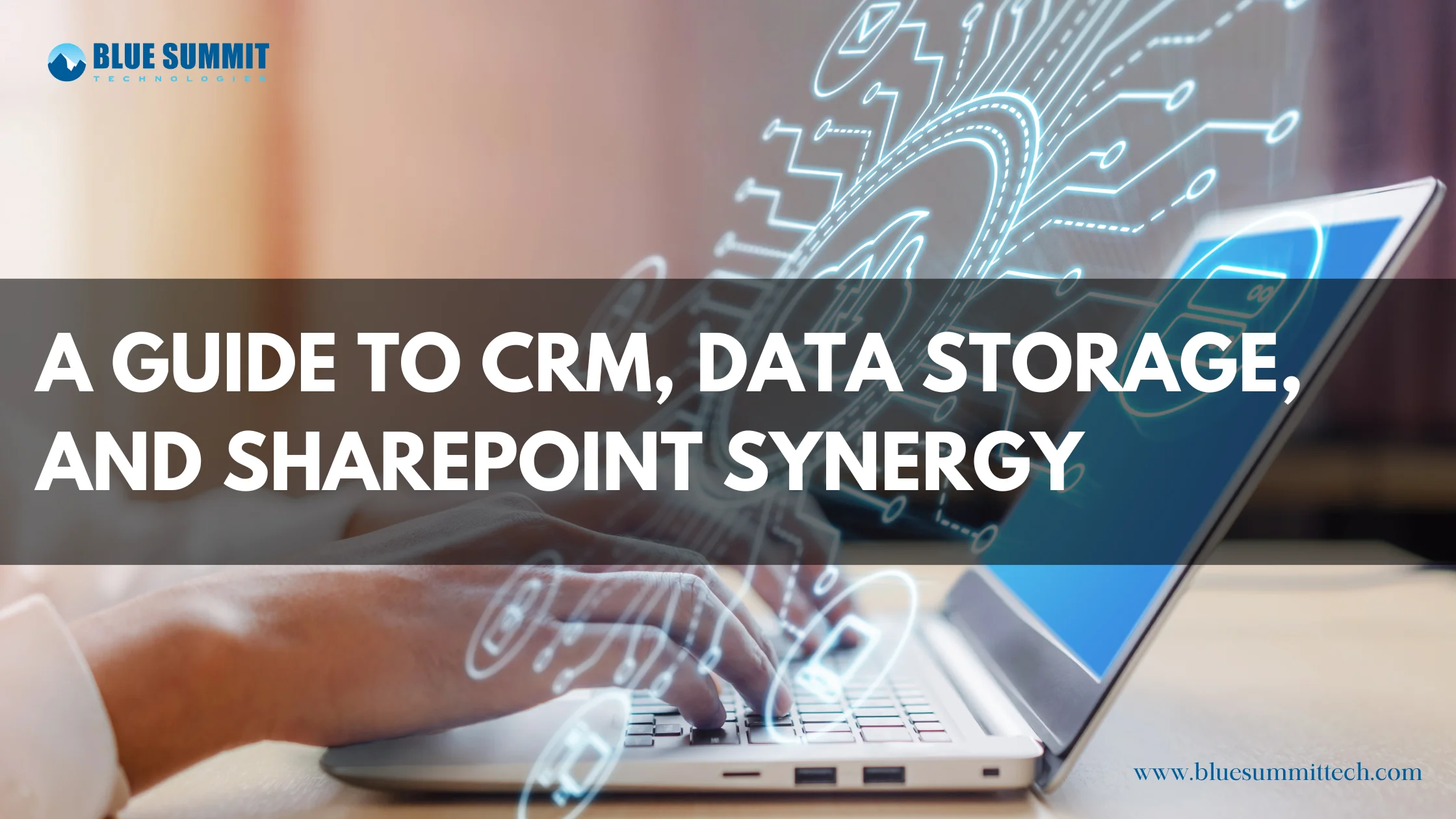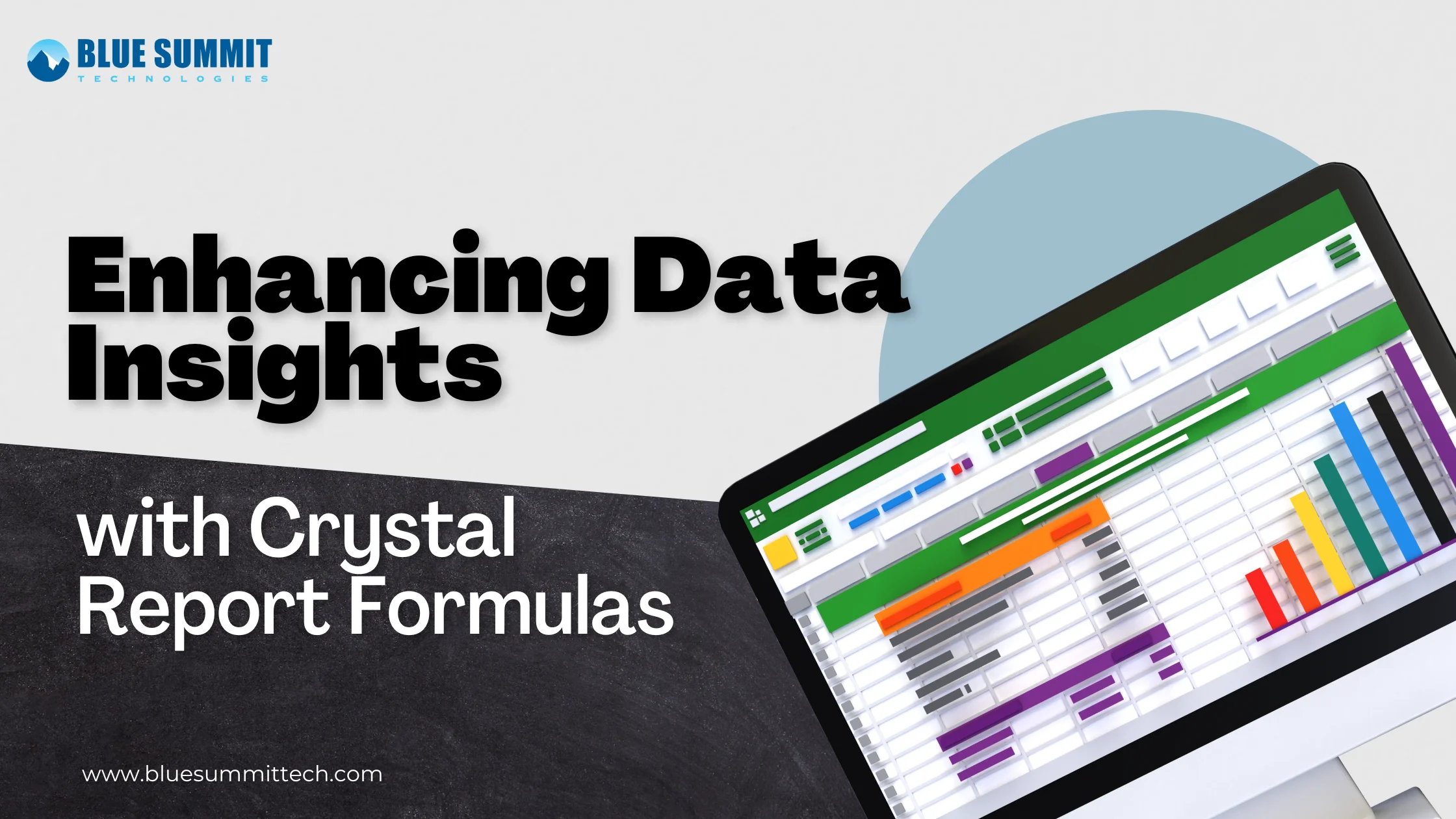
Posted on Monday, Feb 26th, 2024
Managing Your Data in CRM, Data Storage Solutions & SharePoint
In today's interconnected world, where data has become the backbone of business operations, the efficient management of data is paramount for organizations aiming to thrive in increasingly competitive markets and drive sustainable growth. Customer Relationship Management (CRM) systems, data storage solutions, and collaboration platforms like SharePoint have emerged as indispensable tools for businesses seeking to organize, analyze, and capitalize on their data assets effectively.
CRM Integration with SharePoint and Data Storage
CRM systems serve as centralized repositories for customer information, enabling businesses to track interactions, analyze buying patterns, and tailor marketing strategies to individual preferences. By maintaining a comprehensive view of customer data, organizations can foster stronger relationships, enhance customer satisfaction, and drive repeat business. Additionally, CRM platforms facilitate streamlined sales processes, allowing sales teams to manage leads, track opportunities, and forecast revenue more effectively.Data storage solutions play a crucial role in ensuring the security, accessibility, and scalability of organizational data. With the exponential growth of digital information, businesses are faced with the challenge of storing and managing vast volumes of data while maintaining data integrity and compliance with regulatory requirements. Implementing efficient data storage software can significantly enhance organizational productivity and data management capabilities. Effective data storage solutions not only provide ample storage capacity but also incorporate features such as data encryption, backup and recovery capabilities, and data deduplication to safeguard against data loss and unauthorized access.
Collaboration platforms like SharePoint facilitate seamless communication and collaboration among team members, enabling them to share documents, collaborate on projects, and access critical information from any location or device. By centralizing document management and fostering real-time collaboration, SharePoint enhances productivity, accelerates decision-making, and promotes knowledge sharing within organizations.
Understanding the Importance of Data Management
• Data serves as the lifeblood of modern businesses, providing insights into customer behavior, market trends, and operational efficiency.• CRM systems centralize customer data, enabling businesses to enhance customer relationships, streamline sales processes, and personalize marketing efforts.
• Effective data storage solutions ensure data security, accessibility, and scalability, supporting business continuity and regulatory compliance.
• SharePoint facilitates collaboration and document management, improving team productivity and knowledge sharing.
Blue Summit's Guide to Cost-Effective Data Management
However, while CRM systems, data storage solutions, and collaboration platforms offer significant benefits, the costs associated with implementing and managing these technologies can present challenges, particularly for small and medium-sized enterprises (SMEs) with limited financial resources. The upfront costs of software licenses, hardware infrastructure, and implementation services can place a strain on budgetary constraints, while ongoing maintenance expenses, upgrades, and support fees further contribute to the total cost of ownership (TCO).For SMEs, in particular, navigating the complexities of cost management while striving to leverage the capabilities of CRM, data storage, and collaboration platforms can be daunting. Limited IT budgets and competing priorities may force organizations to make difficult trade-offs between investing in technology infrastructure and allocating resources to other areas of the business.
We, at Blue Summit, delve into strategies for managing data in CRM, data storage, and SharePoint while keeping it cost-effective.
1. Opt for Cloud-Based Solutions
• Cloud-based CRM platforms and data storage services offer scalable solutions with pay-as-you-go pricing models, eliminating the need for upfront infrastructure investments.• Providers like Microsoft Azure and Amazon Web Services (AWS) offer cost-effective storage options, coupled with robust security features and flexible scalability.
2. Leverage Open-Source CRM and Collaboration Tools
• Open-source CRM solutions like SuiteCRM and VTiger provide feature-rich alternatives to proprietary CRM systems, often with lower or no licensing costs.• Similarly, platforms like Nextcloud offer open-source collaboration tools that integrate seamlessly with existing infrastructure, reducing dependency on costly proprietary software.
3. Implement Data Lifecycle Management (DLM) Strategies
• Adopting DLM strategies helps optimize data storage costs by automating the process of migrating, archiving, and deleting data based on predefined policies.• Identify and prioritize data based on its value and usage, storing frequently accessed data on high-performance storage tiers and moving less critical data to lower-cost storage options.
4. Utilize SharePoint Online and Office 365
• SharePoint Online, as part of the Office 365 suite, provides cost-effective document management and collaboration capabilities, eliminating the need for on-premises infrastructure.• Subscription-based pricing models offer businesses the flexibility to scale resources according to their needs, without incurring additional hardware or maintenance costs.
Benefits of Cost-Effective Data Management
1. Reduced Total Cost of Ownership (TCO)
By adopting cost-effective data management strategies, businesses can minimize upfront investments and ongoing operational expenses, resulting in a lower TCO.2. Improved Agility and Scalability
Cloud-based solutions and open-source platforms offer greater flexibility and scalability, enabling businesses to adapt quickly to changing data requirements and business dynamics.3.Enhanced Competitiveness
Cost-effective data management empowers SMEs to compete with larger enterprises by leveraging advanced technologies and optimizing resource utilization.4. Enhanced Data Security and Compliance
Leading cloud providers adhere to stringent security standards and compliance certifications, ensuring data confidentiality, integrity, and regulatory compliance.Conclusion
While CRM systems, data storage solutions, and collaboration platforms offer invaluable benefits for businesses seeking to harness the power of data, it is essential to address the cost considerations associated with implementing and managing these technologies effectively. By adopting a strategic approach to cost management, leveraging cloud-based solutions, exploring open-source alternatives, and prioritizing investments based on business objectives, SMEs can maximize the value derived from CRM, data storage, and collaboration platforms while optimizing resource utilization and driving sustainable growth in today's digital age.Effectively managing data in CRM, data storage, and SharePoint is essential for businesses of all sizes to drive innovation, enhance customer experiences, and maintain a competitive edge. By adopting cost-effective strategies such as leveraging cloud-based solutions, open-source platforms, and implementing data lifecycle management practices, businesses can optimize resource utilization, reduce costs, and unlock the full potential of their data assets.
Contact us today to explore cost-effective strategies for managing data across CRM, data storage, and SharePoint platforms.
REFER TO OTHER RELEVANT CONTENTS

Managing Your Data in CRM, Data Storage Solutions & SharePoint
In today's interconnected world, where data has become the backbone of business operations, the efficient management of data is paramount for organizations aiming to thrive in increasingly competitive markets and drive sustainable growth. Customer Relationship Management (CRM) systems, data storage solutions, and collaboration platforms like...
read more








